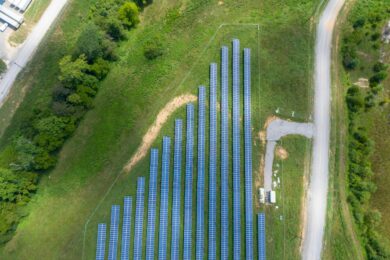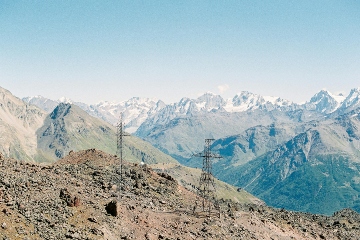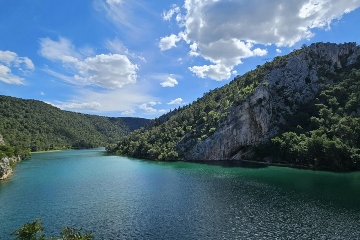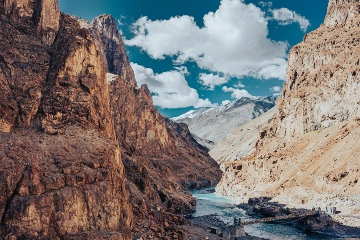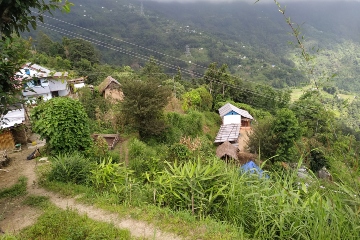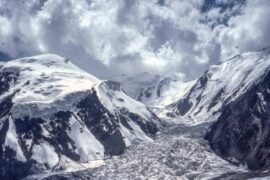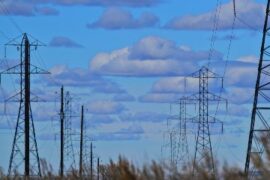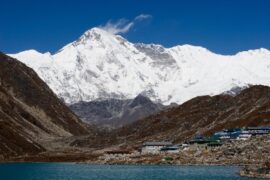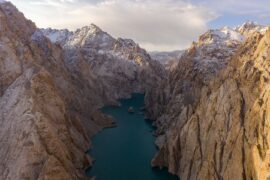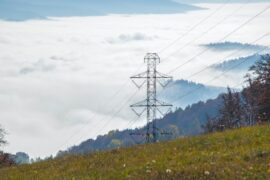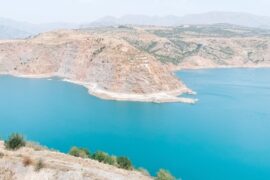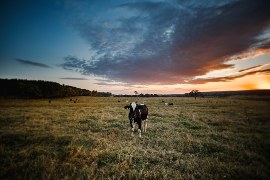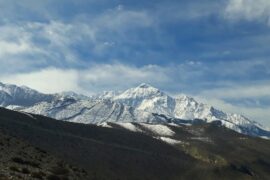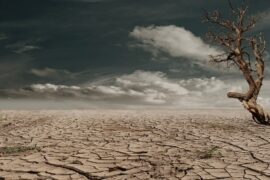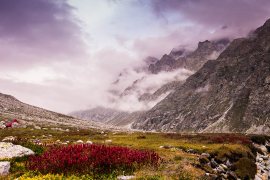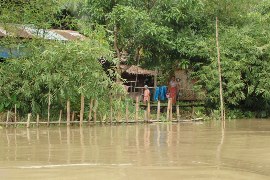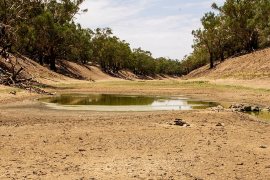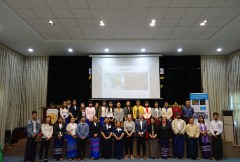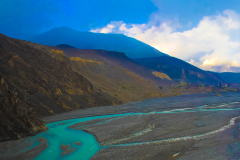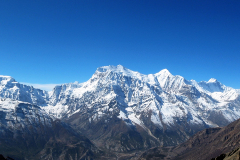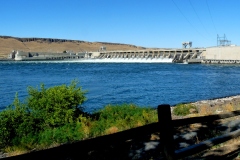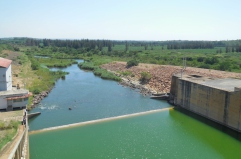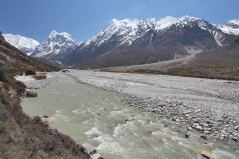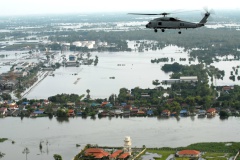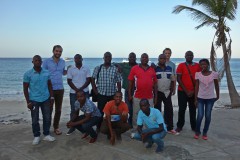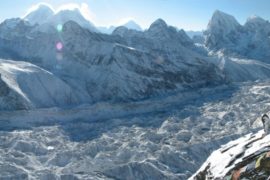Sonu Khanal (Ph.D.) heeft meer dan 12 jaar ervaring in het bieden van technische leiding aan projecten op het gebied van de water-energie-voedsel-nexus, extreme hydro-klimatologische gebeurtenissen, rivieroverstromingen, droogtes, samengestelde kustoverstromingen, multivariate statistische modellen, ensemblemodellering, klimaatrisicobeoordeling en waterkrachtontwikkeling. Zijn ervaring deed hij op bij het Institute of Engineering (IOE, Nepal), het International Centre for Integrated Mountain Development (ICIMOD, Nepal), Practical Action Consulting (PAC, Nepal), het Koninklijk Nederlands Meteorologisch Instituut (KNMI, Nederland), de Vrije Universiteit (VU, Amsterdam, Nederland) en FutureWater.
Bij FutureWater werkte Sonu met kwantitatieve methoden, simulatiemodellen (SPHY, VIC, WEAP, SWAT, HEC-RAS, HEC-HMS), geografische informatiesystemen (ArcGIS, QGIS) en satellietwaarnemingen. Hij is vaardig in het analyseren van multidimensionale hydro-meteorologische informatie met R, Python en GIS-gebaseerde toepassingen. Daarnaast heeft hij ervaring met het ontwikkelen van QGIS-plugins en R-Shiny-applicaties voor klimaaten hydrologische analyses en databasemanagement.
Het afgelopen jaar richtte hij zich op overstromings- en droogterisicostudies in Europese stroomgebieden, de operationalisering van probabilistische overstromingsvoorspellingen in pilotsamenwerkingen met overheidsinstellingen en het voorspellen van droogte-effecten op gewasopbrengsten en watersystemen met behulp van geavanceerde machine learning-technieken. Sonu heeft internationale werkervaring in Europa, Azië en Afrika en werkte samen met klanten en partners zoals de Wereldbank, Aziatische Ontwikkelingsbank, nationale en lokale overheden, stroomgebiedsorganisaties, wetenschappelijke fondsen, universiteiten en onderzoeksinstellingen.
Gerelateerde projecten
-
Rapid Climate Risk and Adaptation Assessment for Solar PV and BESS projects in Uzbekistan
Given the current state of Uzbekistan's electric grid and the growing challenges of climate change, the Asian Development Bank is assisting the government in enhancing the capacity and reliability of the country’s power generation and transmission network. This initiative focuses on developing solar power plants, substations, transmission lines, and battery...
-
Climate Risk and Adaptation Assessment for the Electricity Distribution Infrastructure in Pakistan
The project aims to strengthen the existing power transmission and distribution (T&D) system in Pakistan by rehabilitating infrastructure as the country is currently struggling with deteriorating and climate-vulnerable grid infrastructure. As part of the ‘Power Distribution Strengthening Project’, ADB is assisting the government of Pakistan in rehabilitating and modernizing the...
-
SPHY QGIS Plugin for Hydrological Modeling
SPHY (Spatial Processes in Hydrology) is a conceptual, spatially distributed (raster-based) “leaky-bucket” type water balance model. Developed by FutureWater, with the support of national and international partners, SPHY has emerged as a robust, user-friendly tool for undertaking operational and strategic water resource management decisions. It stands out for its physical...
-
Springshed Management in the Indian Himalayas
Springs in the Hindu Kush Himalaya (HKH) region are essential for water security, agriculture, economic activities, ecosystem services, biodiversity, and cultural heritage. They sustain nearly 240 million people, including 50 million in India who depend directly on these springs for their water needs. However, almost half of the perennial springs...
-
RoSPro: Roadside Spring Protection to Improve Water Security in Nepal
De midden- en hooggelegen gebieden in de Himalaya hebben te kampen met waterschaarste, waardoor ze een van de meest kwetsbare regio's ter wereld zijn. Bronnen zijn essentiële levensaders voor miljoenen berggemeenschappen en vormen de primaire bron voor huishoudelijk water en lokale voedselzekerheid. Helaas is het debiet van bronnen in de...
-
Integrated Water Resources Management in Tajikistan
Given the abundant freshwater resources in Tajikistan, water plays a crucial role in the country's socioeconomic development. However, the rising population, economic growth, and the growing impacts of climate change pose significant challenges to ensure water availability and accessibility. This project aims to address the aforementioned information gap by improving...
-
Climate Risk and Adaptation Assessment for the Electricity Distribution Infrastructure in Uzbekistan
Given Uzbekistan’s accelerated economic growth despite the ongoing global challenges, the government aims to maintain the momentum by implementing structural reforms that will stimulate demand and expand the private sector. This includes enhancing the resilience of the power sector with the support of the Asian Development Bank. As part of...
-
Climate Risk and Adaptation Assessment for Hydropower Project in Nepal
Climate risk and adaptation (CRA) assessment is required for the 635 MW Dudhkoshi hydroelectric project (DKSHEP) to ensure the project addresses climate change mitigation and adaptation in accordance with ADB’s requirements. The initial Climate Risk Assessment (CRA) by FutureWater in 2021 suggested the project is likely to be affected by...
-
WE-ACT: Water Efficient Allocation in a Central Asian Transboundary River Basin
Het algemene doel van het WE-ACT-project is het demonstreren van een beslissingsondersteunend systeem (DSS) voor watertoewijzing in een grensoverschrijdende rivier in Centraal-Azië, om gedeelde voordelen te vergroten en de aanpassing van waterbeheer en -planning aan klimaatverandering te bevorderen.
-
Climate Risk and Adaptation Assessment of the Energy Transmission System in Uzbekistan
The project aims to strengthen the existing power transmission system in Uzbekistan by expanding, rehabilitating, and constructing transmission lines and substations as the country is currently struggling with a weakening and climate-vulnerable grid infrastructure. To address this issue, ADB, in collaboration with FutureWater, is directing its efforts towards enhancing the...
-
Strategic Climate Adaptation Planning for the Amu Darya Basin in Uzbekistan
Uzbekistan's water resources depend to a large extent on those provided by the transboundary Amu Darya river which are fully allocated and highly sensitive to climate change and water demand and management changes. Especially the agricultural sector, but also the energy and urban water supply sector need to transform into...
-
Hoge-resolutie bodemvochtdata ter ondersteuning van onderzoek naar dierziekten
De Gezondheidsdienst voor Dieren (GD) doet onderzoek naar het voorkomen van dierziekten en de relatie met omgevingsvariabelen, zoals klimaat en bodem. Dit project ondersteunt deze werkzaamheiden door het toepassen van een upgrade van de landsdekkende bodemvochtberekeningen die de afgelopen jaren zijn uitgevoerd door FutureWater m.b.v. het hydrologische model SPHY. Het...
-
Climate Risk and Adaptation Assessment for Nepal’s Power Sector
Nepal’s power sector predominantly relies on hydropower generation. Hydropower is vulnerable to climate change and natural disasters caused by climate change. An understanding of the future impact of climate change on hydropower assets and their performance is important for the successful implementation of hydropower projects. Climate risk and adaptation (CRA)...
-
Tool voor Klimaat- en Rampenrisicoscreening en -beoordeling
De Aziatische Ontwikkelingsbank werkt aan een nieuwe generatie tool voor het screenen en beoordelen van klimaat- en rampenrisico's. Deze tool heeft als doel om wetenschappelijk geloofwaardige en context-specifieke screening van projecten te bieden voor risico's in verband met klimaat-en geofysische gevaren in de conceptfase van het project om richting te...
-
Development of a Glacio-Hydrological Model and IWRM Plan for the Uttarakhand subbasin in India
The Swiss Agency for Development and Cooperation’s (SDCs) Global Programme Climate Change and Environment (GP CCE) India is supporting the operationalization of climate change adaptation actions in the mountain states of Uttarakhand, Sikkim and Himachal Pradesh through the phase two of the “Strengthening State Strategies for Climate Action” (3SCA) project...
-
Tailor-made Training on River Morphology and Flood Risk using State-of-the-Art Open Satellite Data and Processing Tools
The main objective is to enhance the capacity of DWIR staff in using innovative data and tools to analyze water resources and support water management. The training is organized with a very practical approach and strongly built upon the ‘learning-by-doing’ principles. Participants use freely accessible satellite-derived data to gain insight...
-
InfoSequia-4CAST: Forecasting and Quantifying Risks of Crop and Water Supply Failures Using Machine Learning and Remote Sensing
InfoSequia-4CAST combines historical and up-to-date observations of satellite-based meteorological and agricultural drought indices with climate variability indices, to generate seasonal outlooks of water supply and crop yield failure alerts. These impact-based indicators are computed using a simple, robust and easily understandable statistical forecasting-modelling framework. By making use of multi-sensor, state-of-the...
-
Tailor-Made Training for water professionals in Myanmar
This tailor-made training enhanced capacity of Yangon Technological University (YTU) educational staff in using Google Earth Engine to analyse water resources and support water management. Technical staff of Department of Meteorology and Hydrology (DMH) and the Department of Water resources and Improvement of River systems (DWIR) also participated to gain...
-
Training on Using Open Source Platforms for Hydrological Modelling of Data Sparse Regions in Nepal
This training was attended by sixteen researchers (seven female and nine male) from IOF, Department of Hydrology and Meteorology (DHM), Central Department of Hydrology and Meteorology (CDHM), Department of Forests and Soil Conservation and the Institute of Engineering (IOE). The overall objective of this training was to ensure the use...
-
Pan-TPE: Changes in the Pan-Third Pole Water Tower
The proposed research targets changes in climate, water supply and demand, and suitable adaptation measures for green development of the Silk Road Economic Belt (SREB) in the river basins crossed by the SREB transect. Given the strong role of large scale hydrology in the proposed research activities, the spatial domain...
-
Hydrological assessment for two potential sites for run-of-river hydropower, southwestern Georgia
A hydrological assessment was carried out for two sites where run-of-river hydropower plants are planned, in the southwestern part of Georgia. Only very limited streamflow data were available, so the assessment was based mainly on hydrological modelling of the basin upstream of the points of interest. Principally global datasets were...
-
Pre-feasibility study of run-of-river hydropower plant, Georgia
There is great potential for hydropower in Georgia. Critical is to conduct accurate feasibility assessments for hydropower generation at the different potential sites of interest. This pre-feasibility assessment delivered daily flow estimates at several locations in Georgia. These flows were used as input into an economic analysis.
-
Training in Water Resources Modelling for ARA-Sul
A Tailor-Made Training on Water Resources Modelling was required to equip the staff of the water agencies in Mozambique (ARAs) with additional knowledge to have a stronger advisory role towards policy and decision makers, and people living in the area. FutureWater provided this training to ARA-Sul and ARA-Norte. This training...
-
Hydropower Development Assessment for the Tamakoshi River Basin
The overall objective of this project is to improve the understanding of the expected impacts of climate change on water availability in the context of potential hydropower development in the Tamakoshi River Basin. Specifically, the project aims to (i) Understand the current baseline hydrological regime of the Tamakoshi River Basin,...
-
System-Risk: A large-scale systems approach to flood risk assessment and management
System-Risk is a Marie-Skłodowska-Curie European Training Network which aims on developing and implementing a systems approach for large-scale flood risk assessment and management and provides a framework for training and career development of 15 Early Stage Researchers (ESRs). In collaboration with the Royal Meteorological Institute (KNMI), FutureWater is the hosting...
-
Training in Water Resources and Allocation Models
A Tailor-Made Training was provided to three ARAs in Mozambique, being ARA-Centro (Beira), ARA-Centro-Norte (Nampula), and ARA-Norte (Pemba). The provided Tailor-Made Training focused on learning to work with a Water Resources and Water Allocation Model, and apply them to a catchment in Mozambique. Emphasis was put on how these tools...
-
HI-AWARE: Himalayan Adaptation, Water and Resilience
HI-AWARE aims to contribute to enhanced adaptive capacities and climate resilience of the poor and vulnerable women, men, and children living in the mountains and flood plains of the Indus, Ganges, and Brahmaputra river basins. Research, including modeling, scoping studies, action research, and randomized control trials, is conducted at 12...
Gerelateerde publicaties
-
2023 - Final Report
Climate Risk Analysis and Prioritisation of Adaptation Measures for the Amu Darya River Basin, Uzbekistan
D. De Condappa, Hunink, J.E., Khanal, S., Nolet, C., Gaffarov, K., Gojenko, B., Muradov, R., Dosmukhamedova, R., Gaipnazarov, N., Iskanov, A., Kholmatjanov, B., Khujakulov, A., Mamarasulov, K., Tursunov, M., Van der Tak, C.
-
2023 - ADB Technical Report
Climate Risk Adaptation Assessment for Dudhkoshi HEP, Nepal
Khanal, S.
-
2023 - FutureWater Report
Climate Change Risk Mapping of the Amu Darya river basin, Uzbekistan
S. Khanal, Nolet, C., Tursunov, M., Hunink, J.E., de Condappa, D.
-
2023 - FutureWater Technical Report
Climate Risk and Adaptation Assessment for the Electricity Distribution Infrastructure in Uzbekistan
Khanal, S., T. Imran, T., Nolet, C.
-
2023 - PanTPE Project Report
An Assessment of Water-related Climate Change Impacts on the Third Pole
Kraaijenbrink, P., Immerzeel, W., Khanal, S., Lutz, A.
-
2023 - FutureWater Report 243
Climate Risk and Adaptation Assessment for Digitize to Decarbonize – Power Transmission Grid Enhancement Project – Uzbekistan
Khanal, S., T. Imran, C. Nolet
-
2023 - Journal of Applied Meteorology and Climatology
Historical Climate Trends over High Mountain Asia Derived from ERA5 Reanalysis Data
Khanal, S., T. S. Tiwari, A.F. Lutz, B.V.D Hurk, W.W. Immerzeel
-
2022 - FutureWater Report 253
Water Allocation in Bhagirathi Basin, India
Droogers, P., Khanal, S., Hunink, J.E.
-
2022 - FutureWater Report 234
InfoSequia-4CAST: Report on InfoSequia-4CAST Development
Contreras, S., G. Guimarães, A. Fernández, S. Khanal, G.W.H. Simons
-
2022 - FutureWater Report 235
InfoSequia-4CAST: Report on InfoSequia Monitor Upgrading
Contreras, S., C. Nolet, S. Khanal, A. Fernández, G.W.H. Simons
-
2022 - FutureWater Report 252
Present-day and Future Changes in the Hydrology of the Bhagirathi Basin
Khanal, S., Nick, F., Fiddes, J., Kraaijenbrink, P., Immerzeel, W., Hunink, J.E.
-
2021 - FutureWater Report 228
InfoSequia-4CAST: Baseline Design Report
Contreras, S., G. Guimarães, G.W.H. Simons, C. Nolet, J.Beard, S. Khanal, A. Fernández
-
2021 - FutureWater Report 242
Climate Risk Adaptation Assessment for Dudhkoshi HEP, Nepal
Khanal, S.
-
2021 - Water Resources Research
Variable 21st Century Climate Change Response for Rivers in High Mountain Asia at Seasonal to Decadal Time Scales
Khanal, S., A.F. Lutz,, P. D. A. Kraaijenbrink, B. van den Hurk, T. Yao, W.W. Immerzeel
-
2019 - Frontiers in Earth Science
Storm Surge and Extreme River Discharge: A Compound Event Analysis Using Ensemble Impact Modeling
Khanal, S., N. Ridder, H. de Vries, W. Terink, B. van den Hurk
-
2019 - Atmosphere
The Impact of Meteorological and Hydrological Memory on Compound Peak Flows in the Rhine River Basin
Khanal, S., A.F. Lutz, W.W. Immerzeel, H. de Vries, N. Wanders, B. van den Hurk
-
2017 - FutureWater Report 175
Hydrological pre-feasibility assessment for hydropower facility in Northern Georgia
Khanal, S., J.E. Hunink
-
2017 - PLOS ONE
Future changes in hydro-climatic extremes in the Upper Indus, Ganges, and Brahmaputra River basins
Wijngaard, R.R., A.F. Lutz, S. Nepal, S. Khanal, S. Pradhananga, A.B. Shrestha, W.W. Immerzeel
-
2017 - FutureWater Report 164
Hydrological and Climate Change Assessment for Hydropower development in the Tamakoshi River Basin, Nepal
Terink, W., W.W. Immerzeel, A.F. Lutz, P. Droogers, S. Khanal, S. Nepal, A.B. Shrestha
-
2016 - FutureWater Report 160
SPHY: Spatial Processes in Hydrology. Advanced training: input data, sensitivity analysis, model calibration, and scenario analyses
Terink, W., S. Khanal

